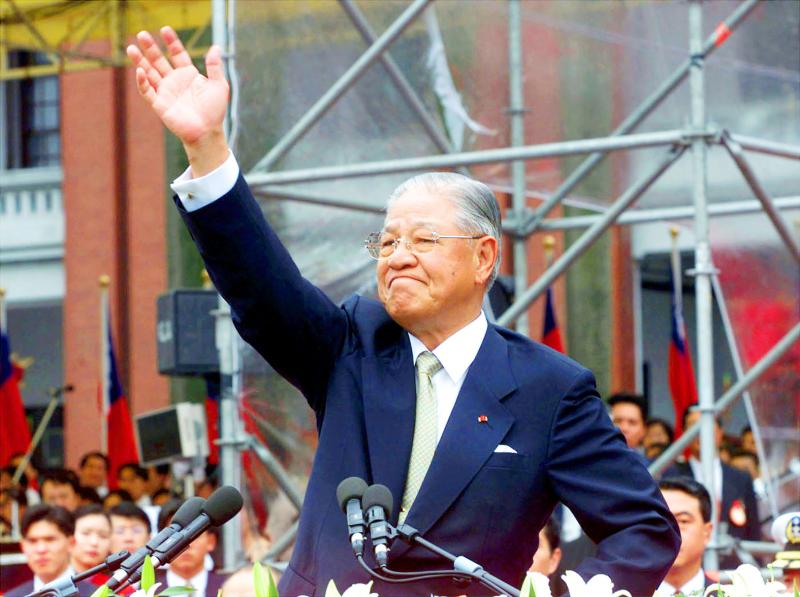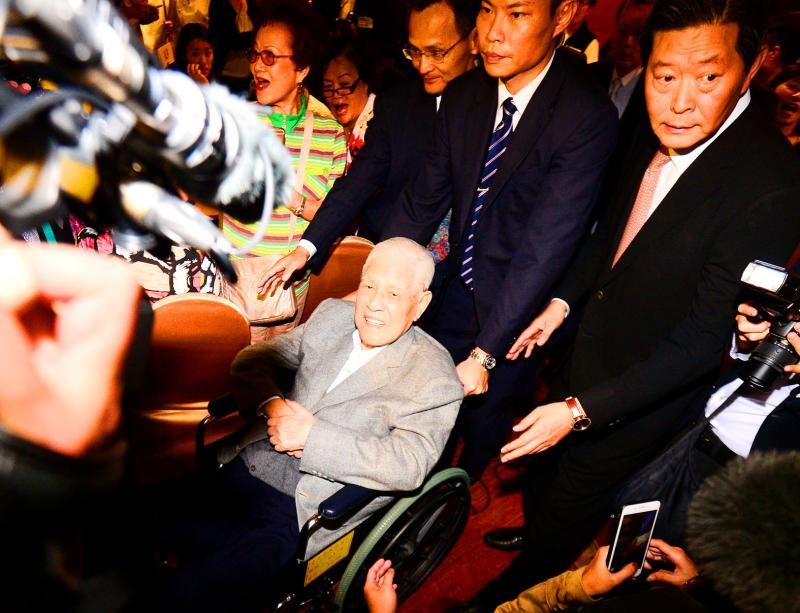Former president Lee Teng-hui (李登輝) passed away at 7:24pm yesterday at Taipei Veterans General Hospital. He was 97 years old.
The hospital stated the cause of death as septic shock and multiple organ failure.
Lee had been hospitalized there since February, when he choked on a mouthful of milk at home. He was later diagnosed with pulmonary infiltrates and aspiration pneumonia.

Photo: Reuters
The hospital said that Lee had been treated with antibiotics, but that his health had not improved, as his advanced age and diabetes had inhibited his immune system and led to recurring infections.
During his hospitalization, Lee underwent daily kidney dialysis, which removed electrolytes and excess liquids, so that nutrient solutions introduced via intravenous drip and blood infusions would bring him strength.
The hospital said that Lee’s body would remain at the hospital until Lee’s wife, Tseng Wen-hui (曾文惠), and his family, could make further arrangements.

Photo: Wang Yi-sung, Taipei Times
Yesterday, when a doctor announced Lee’s passing, Tseng was by his side, the hospital added.
During his lifetime, Lee underwent 12 stent procedures, 11 for his heart and one for his vertebral artery — installed when he was 92 years old.
Lee had been diagnosed with colorectal cancer in 2011 and underwent a colectomy to remove the tumor that year. In 2007, he was diagnosed with cataracts, and had an intraocular lens inserted in 2013.
President Tsai Ing-wen (蔡英文) expressed her deep sadness at Lee’s passing, and instructed the Presidential Office and other government agencies to offer Lee’s family whatever assistance they might need.
Presidential Office Secretary-General Su Jia-chyuan (蘇嘉全) said that Taiwanese should thank Lee for choosing democracy at a critical time in history, leading the country out from under the shadow of autocratic government.
Former president Ma Ying-jeou (馬英九) also offered his condolences to Lee’s family through his office, while affirming Lee’s contributions to Taiwan’s democratization.
Ma believes that while Lee’s political ideas underwent major changes after he left the presidency, history would render a just and objective evaluation of Lee’s career, the office said.
Taipei Mayor Ko Wen-je (柯文哲) yesterday posted a photograph of him visiting Lee at the hospital in May last year.
Lee is most admired not only for his political achievements, but also for his life philosophy, which is full of wisdom, Ko wrote on Facebook.
Lee allowed the nation to smoothly evolve from an authoritarian regime to a democratic one, and he was able to withdraw from the political scene at his peak, Ko wrote, describing Lee as a “hero of the era.”

The Central Election Commission has amended election and recall regulations to require elected office candidates to provide proof that they have no Chinese citizenship, a Cabinet report said. The commission on Oct. 29 last year revised the Measures for the Permission of Family-based Residence, Long-term Residence and Settlement of People from the Mainland Area in the Taiwan Area (大陸地區人民在台灣地區依親居留長期居留或定居許可辦法), the Executive Yuan said in a report it submitted to the legislature for review. The revision requires Chinese citizens applying for permanent residency to submit notarial documents showing that they have lost their Chinese household record and have renounced — or have never

A magnitude 5.6 earthquake struck off the coast of Yilan County at 12:37pm today, with clear shaking felt across much of northern Taiwan. There were no immediate reports of damage. The epicenter of the quake was 16.9km east-southeast of Yilan County Hall offshore at a depth of 66.8km, Central Weather Administration (CWA) data showed. The maximum intensity registered at a 4 in Yilan County’s Nanao Township (南澳) on Taiwan’s seven-tier scale. Other parts of Yilan, as well as certain areas of Hualien County, Taipei, New Taipei City, Taoyuan, Hsinchu County, Taichung and Miaoli County, recorded intensities of 3. Residents of Yilan County and Taipei received

Taiwan has secured another breakthrough in fruit exports, with jujubes, dragon fruit and lychees approved for shipment to the EU, the Ministry of Agriculture said yesterday. The Animal and Plant Health Inspection Agency on Thursday received formal notification of the approval from the EU, the ministry said, adding that the decision was expected to expand Taiwanese fruit producers’ access to high-end European markets. Taiwan exported 126 tonnes of lychees last year, valued at US$1.48 million, with Japan accounting for 102 tonnes. Other export destinations included New Zealand, Hong Kong, the US and Australia, ministry data showed. Jujube exports totaled 103 tonnes, valued at

BIG SPENDERS: Foreign investors bought the most Taiwan equities since 2005, signaling confidence that an AI boom would continue to benefit chipmakers Taiwan Semiconductor Manufacturing Co’s (TSMC, 台積電) market capitalization swelled to US$2 trillion for the first time following a 4.25 percent rally in its American depositary receipts (ADR) overnight, putting the world’s biggest contract chipmaker sixth on the list of the world’s biggest companies by market capitalization, just behind Amazon.com Inc. The site CompaniesMarketcap.com ranked TSMC ahead of Saudi Aramco and Meta Platforms Inc. The Taiwanese company’s ADRs on Tuesday surged to US$385.75 on the New York Stock Exchange, as strong demand for artificial intelligence (AI) applications led to chip supply constraints and boost revenue growth to record-breaking levels. Each TSMC ADR represents